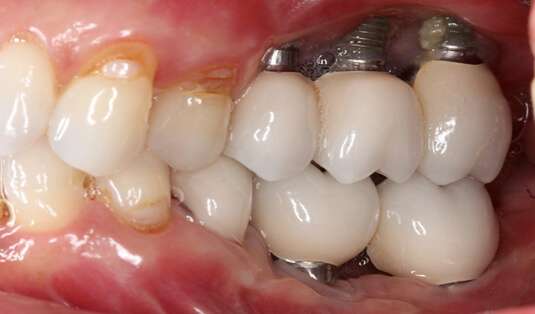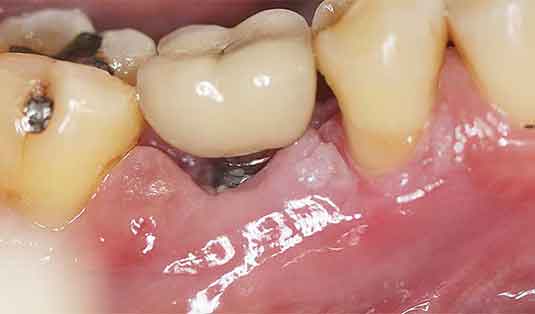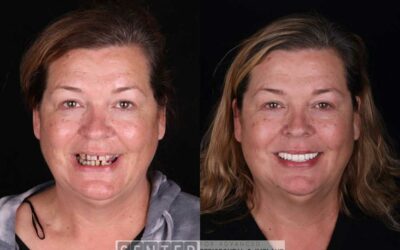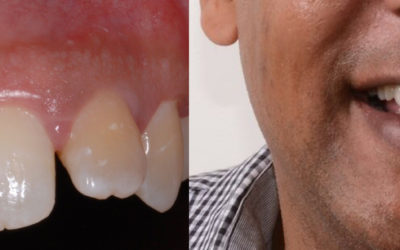What You Must Know About Gum Disease & Dental Implants
Gum disease is the leading cause of tooth loss. It’s also the #1 risk to dental implants. Although dental implants don’t’ get “gum disease” per se, they’re still susceptible to a similar type of infection known as peri-implantitis, which is the implant form of periodontal disease.
As you might guess, our Los Angeles dental implant experts want your smile to be completely free of periodontal disease before placing any dental implants. Otherwise, you run the risk of dental implant failure and complications. We want our dental implant treatment to be predictable and last a lifetime.


Dr. Alexandre-Amir Aalam and Dr. Alina Krivitsky are both periodontal specialists, offering the expertise you need if you’re planning on getting dental implants after recovering from periodontal disease. If you currently have gum disease or you’ve experienced periodontal disease symptoms, our dental implant experts can help you get your oral health back under control. That way you can safely replace your missing teeth without unnecessary risks to your dental implants.
What Causes Dental Implant Gum Disease?
It’s easy to develop gum disease any time plaque buildup goes undisturbed. When bacteria sit there too long, the gum tissue becomes red and inflamed. Bleeding and gum detachment soon follow.
Gum disease is the normal result of our immune response to dental plaque and tartar buildup. Whether it’s around natural teeth or dental implants, your body can’t tell any different. Unless those areas of residue are removed daily with thorough tooth brushing and flossing.
Over time, this bacterial infection will spread down under the gums, causing them to detach from the natural teeth or your dental implants. Plaque can also calcify into tartar, which isn’t removable with a
toothbrush or floss. As tartar (calculus) accumulates above and below the gum tissue, the condition evolves from reversible gingivitis into severe periodontal disease. With gum disease, bone loss accompanies the detachment of gum tissue. Eventually, deep “pockets” (periodontal pockets) form under the gums, contributing to loose teeth.
Symptoms of Gum Disease
Healthy gums tend to be smooth, light pink, and never bleed when you’re brushing or flossing. But with moderate to severe gum disease, people typically experience signs and symptoms like:
- Receding gums
- Tooth loss
- Loose teeth
- Gums bleed when brushing or flossing
- Sensitive teeth
- Tooth decay on root surfaces
- Spaces between teeth
- Bone loss visible on dental X-rays
- Periodontal pocketing around teeth and implants
Periodontal health is also directly related to your overall wellness. Even though damaged teeth or bad breath may seem like the biggest issues, periodontal disease can also strain your immune system. People with active periodontal disease are typically at a higher risk of diabetes, heart disease, stroke, pneumonia, and reproductive health problems.
People who smoke may not experience the same visible warning signs as non-smokers. For example, a smoker who is developing gum disease typically won’t have swollen gum tissues or gums that bleed. Until they start losing teeth and need dental implants, they may never realize there’s a problem.
During your dental exam, Dr. Alexandre-Amir Aalam or Dr. Alina Krivitsky will evaluate your tissue attachment and bone levels. From there, they can recommend an appropriate care plan or modified oral hygiene routine to help you enjoy a healthy mouth. If you’re at risk for tooth loss, certain therapeutic or surgical procedures can help stop your infection in its tracks.
Can I Just Pull My Teeth and Get Dental Implants?
Whether you’re seeing an implant dentist/periodontist or your family dentist for regular checkups, the top priority is to preserve your natural teeth whenever possible. That may mean making a plan to treat gum disease, depending on how severe the infection and bone loss is.
For moderate gum disease, a series of deep cleanings (periodontal scaling and root planing) is recommended. During these deep cleaning visits, we remove plaque and tartar inside of the gum pockets and along the roots of your teeth.
Severe gum disease may require periodontal surgery in addition to deep cleanings. Gum grafting, bone grafting, or crown lengthening may be recommended depending on the severity of your infection. Severe cases where bone structure is compromised may not be able to support teeth or dental implants without surgery.
You can prevent gum disease by visiting your dentist regularly for professional cleanings, periodontal screenings, and having a good oral hygiene routine at home. That means flossing around teeth and implants daily and brushing along the gum line thoroughly at least twice each day. Remember, plaque gradually calcifies into tartar, so professional dental cleanings are a must!
Periodontal therapy is typically recommended when there has been a lack of professional cleanings and home care. Our dental office helps to intercept and provide periodontal treatment before tooth loss occurs (as long as the infection is addressed promptly.)
If your gum disease is significant enough to lead to missing teeth, it will also compromise your dental implants. We cannot install fixed tooth replacement options like implant bridges, All-on-4 implants, or other implant restorations if there is active gum disease.
It’s common to replace a missing tooth or multiple teeth with dental implants. No matter how many lost teeth there are to restore, our Los Angeles periodontal experts can help give you the healthy smile you need and deserve.
Dental Implants After Gum Disease
Is it possible to have a dental implant installed after losing a natural tooth to gum disease? Absolutely. But only if the periodontal disease symptoms are completely under control. That’s where the importance of working with a team of periodontal specialists comes in. Our Los Angeles periodontists, Dr. Alexandre-Amir Aalam and Dr. Alina Krivitsky are experts when it comes to managing gum disease, tooth loss, and restoring smiles with dental implants.
Yes, it’s possible to have healthy gums after gum disease treatments. But working with a periodontal specialist is key. Once your gum tissues and bone are stable, we can continue with the dental implant procedure.
Contact Center for Advanced Periodontal & Implant Therapy today to reserve a no-obligation evaluation for dental implants or gum disease treatment.
You May Also Like...
Elevating Dental Implant Standards in Los Angeles for Patient Safety
Sarah's Implant Journey: A Testament to Transformation Meet Sarah. Three years ago, Sarah avoided mirrors, rarely...
Comparing Immediate Load vs. Traditional Dental Implants
Dental implants have revolutionized the way we replace missing teeth. They're not just prosthetics; they restore the...
Overcoming Dental Anxiety for Fear-Free Dental Implants
Dental anxiety is a common concern shared by many patients. It's not just about the fear of pain; it's also about the...



